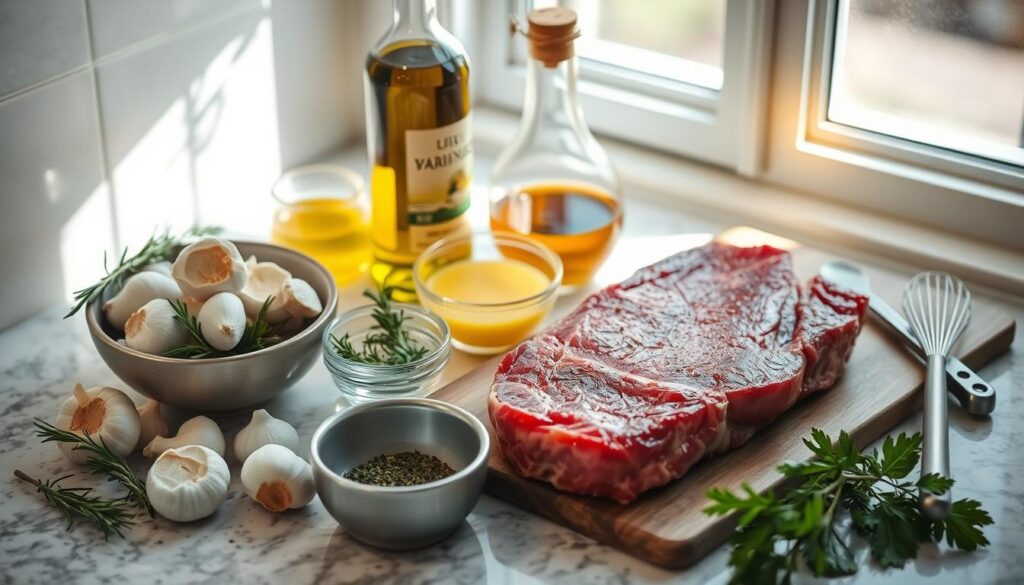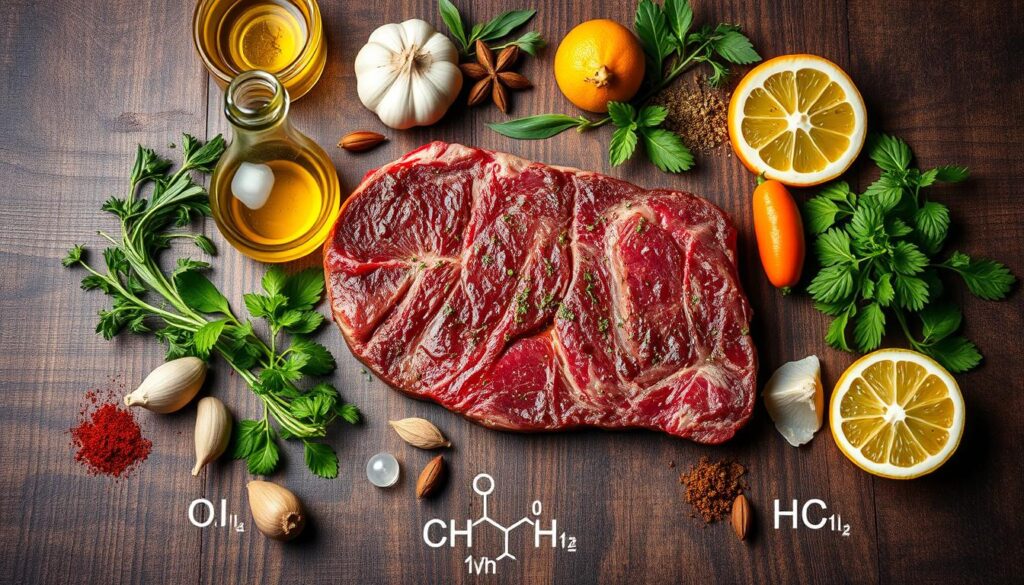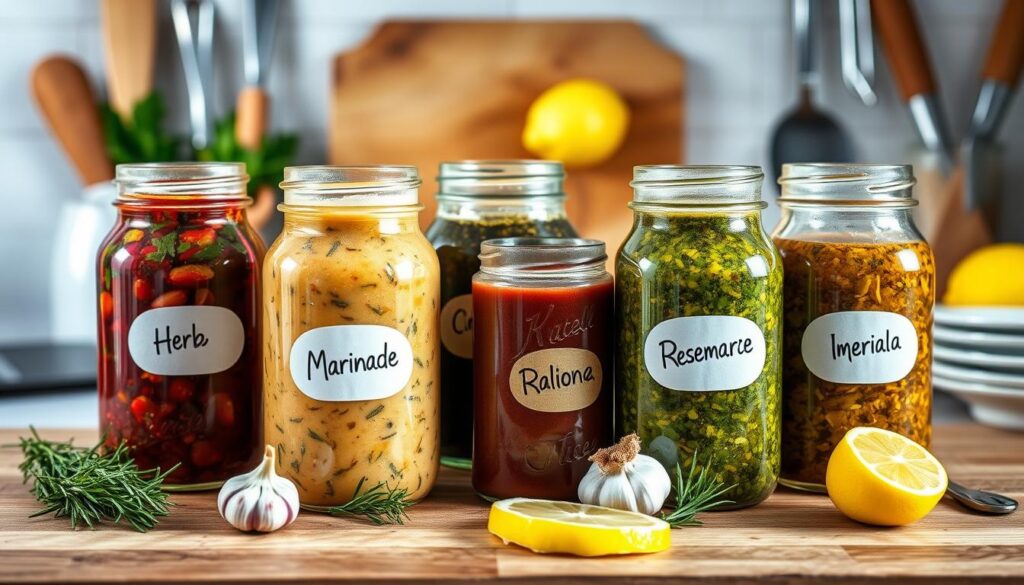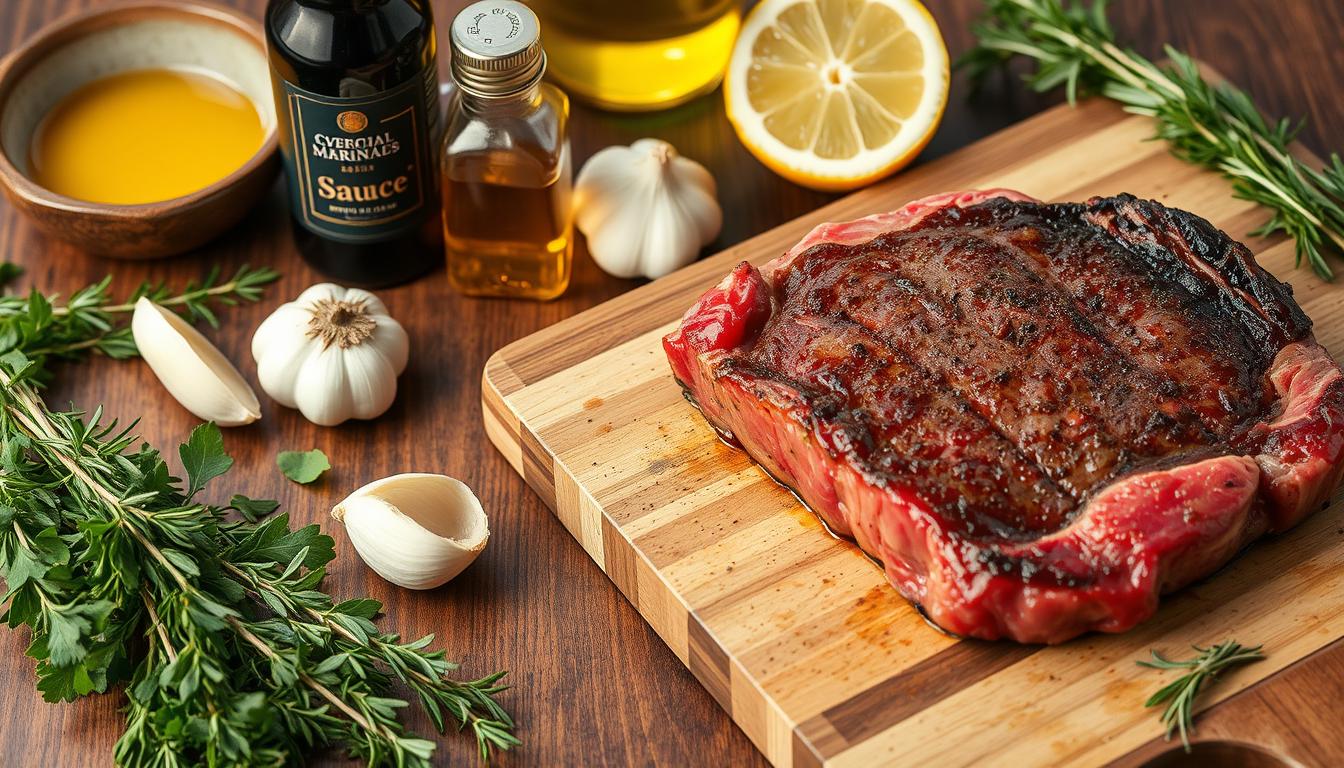Every summer evening, I remember standing beside my grandfather’s grill. He would turn ordinary beef into mouthwatering masterpieces. Those moments sparked my passion for the best steak marinade recipe.
A homemade steak marinade is more than flavor—it’s culinary magic. With just 10 minutes of prep, you can make your steak extraordinary. It works wonders on any cut, from budget-friendly to premium filet mignon.
Professional chefs see marinating as an art. It’s about using each ingredient to tenderize and boost the meat’s natural flavors. Olive oil, Worcestershire sauce, and more all play key roles in a memorable meal.
This ultimate steak marinade recipe will elevate your grilling. Get ready to unlock flavors that will impress your family and friends. Are you ready to become a backyard grilling champion?
Table of Contents
What Makes a Great Steak Marinade?
Making the perfect steak marinade is an art. It’s about mixing flavors, textures, and chemistry. Knowing the key parts can turn simple meat into a dish to remember.
A great steak seasoning comes from choosing the right ingredients. These ingredients work together to make your meat taste better and feel softer. Let’s look at what makes a marinade stand out.
Understanding Flavor Balance
Getting the flavor right is all about mixing ingredients wisely. Your marinade should have:
- Acidic parts for tenderizing
- Oils to keep it moist
- Seasonings for rich taste
- Sweet things for caramelizing
Importance of Acid in Marinades
Acidic ingredients are key for tenderizing meat. Things like lemon juice, vinegar, or wine make the meat tender and add brightness to the taste.
“The right acid can transform a tough cut into a tender delicacy.”
The Role of Oil and Seasonings
Oils carry the flavors in your marinade. They spread the seasonings and keep the meat moist while it cooks.
| Ingredient Type | Purpose | Examples |
|---|---|---|
| Oils | Moisture retention | Olive oil, Canola oil |
| Acids | Tenderizing | Lemon juice, Vinegar |
| Seasonings | Flavor enhancement | Garlic, Herbs, Pepper |
Try different mixes to find your favorite steak seasoning. A great marinade can turn any meat into a dish fit for a restaurant.
Essential Ingredients for a Perfect Marinade
Making a simple steak marinade is an art. It’s about finding the right mix of ingredients. Each part is key to creating deep, rich flavors that turn plain meat into a dish to remember.
Choosing the Right Type of Oil
Olive oil is the base of most marinades. It’s smooth and mild, making it perfect for carrying other flavors. For the best taste, use extra virgin olive oil.
- Extra virgin olive oil (¼ cup)
- Cold-pressed options for best quality
- Helps distribute flavors evenly
Selecting Fresh Herbs and Spices
Fresh herbs make a marinade go from good to great. Here are some top picks:
| Herb/Spice | Quantity | Flavor Profile |
|---|---|---|
| Fresh Thyme | 1 tablespoon | Earthy, slightly minty |
| Garlic | 1 tablespoon (minced) | Sharp, pungent |
| Black Pepper | 1 teaspoon | Warm, slightly spicy |
The Benefits of Adding Sweeteners
Sweeteners like brown sugar add more than taste. They help create a beautiful caramelization on the steak. This adds a rich, complex flavor.
“A touch of sweetness can transform your marinade from simple to spectacular.” – Culinary Expert
When you mix these ingredients well, you get a marinade that tenderizes and boosts the steak’s natural flavors. Play with the amounts to find your ideal mix.
Common Marinade Mistakes to Avoid
Making a tasty steak marinade needs careful attention. Many home cooks make mistakes that can spoil the flavor and texture. Knowing these mistakes helps you make a better marinade.
The Danger of Over-Marinating
Time is key when marinating steak. Flank steak, with its low fat, is especially sensitive to over-marinating. Here’s a general guide for marinating times:
- Thin cuts: 2-4 hours max
- Tougher cuts: Up to 8 hours
- Citrus-based marinades: 1-3 hours best
Choosing the Right Marinating Container
The container you choose matters a lot. Stay away from metal, as it can change the flavor. Use glass, ceramic, or food-grade plastic instead.
Never Skip the Salt
Salt is vital for a flavorful marinade. It does several things:
- Boosts meat flavor
- Makes the meat tender
- Improves seasoning
Pro tip: Use about 3 tablespoons of soy sauce for a perfect balance of saltiness and umami in your marinade.
Avoiding these mistakes will help you make a marinade that makes your steak taste amazing.
The Best Cuts of Steak for Marinating
Not all steaks are the same when it comes to marinating. Some cuts soak up flavors better and get a boost from a great marinade. Knowing which steaks are best for marinades can make your grilling better.
Different steak cuts react differently to marinades. Your choice of cut can change how your steak tastes and feels when grilled.
Ribeye: Rich Flavor and Juiciness
Ribeye is a top cut known for its marbling. It’s tasty on its own, but a good marinade can make it even better. For ribeye, marinating for 30-60 minutes is best to keep its flavor rich.
Sirloin: Tender and Versatile
Sirloin is tender and affordable. It’s good for marinating for about 4 hours. This lets the flavors get in without overpowering its taste.
Flank Steak: Perfect for Grilling
Flank steak is great for marinades because it’s lean. It absorbs flavors fast and gets tender when marinated right.
| Steak Cut | Marinating Time | Flavor Absorption |
|---|---|---|
| Ribeye | 30-60 minutes | Moderate |
| Sirloin | 4 hours | High |
| Flank Steak | 2-4 hours | Very High |
“The right marinade can transform an ordinary steak into an extraordinary meal.” – Culinary Expert
When picking a steak for marinating, remember that tougher cuts with less marbling do well with longer marinating. You want to add flavor and tenderness while keeping the meat’s natural taste.
- Choose lean cuts for longer marinating
- Avoid over-marinating tender cuts
- Match marinating time to the steak’s texture
How to Prepare Your Steak for Marinating
Getting your steak ready is key for a tasty homemade marinade. The right steps can make your steak tender and full of flavor.
Trimming Excess Fat
Start by trimming off extra fat from your steak. Some fat is good, but too much stops the marinade from getting in. Use a sharp knife to remove thick fat, leaving a thin layer that keeps the meat moist.
Tenderizing Techniques
Make your steak tender for better marinade absorption. Here are some ways to do it:
- Use a meat mallet to gently pound the steak
- Score the surface with shallow cuts
- Choose naturally tender cuts like chuck eye steak
Slicing for Maximum Flavor Absorption
How you slice your steak matters a lot. For thin cuts like flank or skirt steak, slice against the grain. This helps the marinade get in deeper. Here’s how long to marinate:
- Thin steaks: 1-4 hours
- Thicker cuts: 4-8 hours
- Tough cuts: Minimum 4 hours
“The secret to a perfect marinade is not just in the ingredients, but in the preparation.”
Pro tip: Marinate in a resealable plastic bag to cover evenly. Keep it in the fridge to stay safe and fresh.
Step-by-Step Guide to Marinating Steak
Learning to make an easy steak marinade can turn a simple cut of meat into a gourmet dish. It’s simpler than you think, with just a few steps to get the best flavor and tenderness.

First, collect all your ingredients and tools. A good marinade needs precision and care to boost your steak’s taste.
Mixing Your Marinade
To make a great easy steak marinade, follow these easy steps:
- Start with olive oil (1½ cups), soy sauce (½ cup), and maple syrup (⅓ cup)
- Then, whisk in rice vinegar (¼ cup)
- Add dry seasonings:
- 1½ teaspoons onion powder
- ½ teaspoon garlic powder
- 1 teaspoon ground ginger
- Finally, mix everything well until it’s smooth
Properly Coating the Steak
To make a simple steak marinade work, make sure to cover the meat evenly. Put the steak in a non-reactive container or a resealable bag. Pour the marinade over it. Rub the marinade all over the steak to spread it evenly.
Recommended Marinating Times
Marinating times depend on the steak cut:
| Steak Type | Marinating Time |
|---|---|
| Thin cuts (skirt, flank) | 2-4 hours |
| Thick or tough cuts | 8-24 hours |
Pro tip: Don’t marinate for more than 24 hours. Acid can break down the meat’s protein, making it mushy.
“The secret to a perfect steak is not just in the cooking, but in the preparation.” – Culinary Expert
Always refrigerate your steak while it marinates. Turn it now and then for even flavor. Your patience will pay off with a tender and tasty meal!
Creative Variations of Steak Marinades
Want to make your steak marinade stand out? Try new flavor mixes that turn regular meat into a feast for your taste buds. A tasty marinade can take you on a culinary journey with just a few ingredients.
Discovering marinades from around the world lets you play with unique tastes. Each mix adds its own special touch to your dishes.
Asian-Inspired Soy Sauce Marinade
Make a memorable Asian-style marinade with these ingredients:
- 1/3 cup soy sauce
- 2 tablespoons sesame oil
- Fresh ginger
- Minced garlic
- Brown sugar
Mediterranean Herbaceous Marinade
For a taste of the Mediterranean, try this marinade:
- Olive oil
- Fresh lemon juice
- Oregano
- Thyme
- Rosemary
Smoky Chipotle Marinade
Looking for something spicy? This marinade packs a punch:
- Chipotle peppers in adobo sauce
- Lime juice
- Cumin
- Smoked paprika
- Olive oil
*Pro tip: Always marinate in a non-reactive container and refrigerate to maximize flavor absorption.*
Each marinade gives your steak a unique twist, making every meal special. Try these out to find your favorite.
| Marinade Style | Key Flavor Profile | Best Steak Cut |
|---|---|---|
| Asian-Inspired | Umami, Sweet, Tangy | Flank Steak |
| Mediterranean | Herbal, Bright, Fresh | Sirloin |
| Smoky Chipotle | Spicy, Smoky, Bold | Ribeye |
The Science Behind Marinating
Marinating is more than a cooking trick. It’s a science that turns your steak into something special. When you marinate steak, you start a chemical reaction. This reaction makes the steak taste better and feel softer.

How Marinades Enhance Flavor
The magic of marinating is in the tiny details. Steak seasoning works in several ways:
- Salt pulls out moisture, which then soaks up flavors
- Acids break down tough meat fibers
- Enzymes from fruits make the meat tender
- Oils spread flavors all over
The Chemical Process of Tenderization
Acids like vinegar or citrus juice start breaking down proteins when you marinate steak. Enzymatic tenderizers from fruits like papaya or pineapple help too. Even though meat only takes in 5-10% of the marinade, it’s enough to change the flavor a lot.
“Marination is the art of science meeting cuisine” – Culinary Experts
Marinating vs. Brining: What’s the Difference?
Marinating and brining both aim to improve meat’s taste and texture. But they do it in different ways. Marinating uses acids and enzymes to add flavor. Brining, on the other hand, uses salt water to keep meat moist.
| Technique | Primary Goal | Key Ingredients |
|---|---|---|
| Marinating | Flavor Enhancement | Acids, Oils, Herbs |
| Brining | Moisture Retention | Salt, Water |
Knowing these science facts can make your steak prep go from good to great.
Cooking Techniques After Marinating
After making your grilled steak marinade, picking the right cooking method is key. Each method has its own benefits for making your steak truly special.
The best steak marinade recipe needs a great cooking method to match. Knowing how to cook your steak can make it taste like it’s from a restaurant.
Grilling: Achieving the Perfect Char
Grilling is the top choice for cooking marinated steaks. To get those perfect grill marks:
- Preheat grill to 450°F
- Remove steak from marinade and pat dry
- Sear for 3-4 minutes per side
- Flip only once for optimal crust development
Pan-Searing for Crusty Perfection
If you can’t grill outside, pan-searing is a great alternative. Cast iron skillets are best for a crispy crust. Heat your skillet until it’s very hot, then cook the steak for 4-6 minutes per side.
Baking: A Surprising Option
Baking is a controlled way to cook your marinated steak. Preheat your oven to 375°F and cook until it reaches your desired doneness:
| Doneness | Temperature |
|---|---|
| Rare | 125°F |
| Medium-Rare | 135°F |
| Medium | 145°F |
Pro tip: Always let your steak rest for 5-10 minutes after cooking. This lets the juices spread, making it tender and flavorful.
Best Practices for Storing Leftover Marinade
When you make a homemade steak marinade, knowing how to store it is key. It keeps your food safe and the flavors strong. Handling your marinade right stops bacteria and brings out the best taste.

Safety Guidelines for Reusing Marinades
Don’t use marinade that touched raw meat without heating it up first. Bacteria from the meat can make the liquid unsafe. To make your marinade safe again:
- Boil the marinade for at least 5 minutes
- Make sure it gets to 165°F
- Keep stirring while it boils
Freezing vs. Refrigerating
You can store your leftover marinade in two ways:
| Storage Method | Duration | Best For |
|---|---|---|
| Refrigeration | Up to 1 week | Short-term storage |
| Freezing | Up to 2 months | Long-term preservation |
Creative Uses for Leftover Marinade
Don’t throw away your marinade! After boiling it safely, you can use it in many tasty ways:
- As a sauce for grilled veggies
- As a quick salad dressing
- Over roasted meats
“Waste not, want not” – Turn your leftover marinade into a tasty journey!
By sticking to these storage tips, you keep your food safe and enjoy your marinade to the fullest.
Pairing Tips: Complementing Your Steak Marinade
Creating the perfect meal is more than just a tasty steak marinade. The right sides, wines, and sauces can make it unforgettable. Your flavorful steak marinade needs dishes that bring out its best.
Selecting Complementary Side Dishes
The best side dishes should match and enhance your steak’s marinade. Here are some classic choices:
- Classic wedge salad with blue cheese dressing
- Roasted garlic mashed potatoes
- Grilled asparagus with lemon zest
- Caramelized onion risotto
Wine Pairings to Enhance Flavors
Choosing the right wine can turn your steak into a gourmet treat. Strong red wines usually match the bold flavors of a tasty steak marinade.
- Cabernet Sauvignon for bold marinades
- Malbec for spicy flavor profiles
- Syrah for smoky marinades
Sauces to Rival Your Marinade
While your marinade is great on its own, these sauces can add something special:
- Chimichurri for herbaceous notes
- Béarnaise for classic elegance
- Peppercorn sauce for a spicy kick
Pro tip: Always taste your marinade and sauce together before serving to ensure they harmonize perfectly.
The aim is to create a balanced meal that highlights your marinated steak. It should also delight your taste buds with thoughtful accompaniments.
Conclusion: Elevate Your Steak Game with Marinades
Learning to make a simple steak marinade can change your cooking game. It’s about finding bold flavors and tender textures that match top steakhouse quality. By balancing acids, oils, and seasonings, you can make every piece of meat amazing.
Finding the best steak marinade recipe is about what you like. Try mixing different herbs, spices, and methods to make your own unique marinades. Whether you like a classic rosemary-garlic mix or something spicy, your marinade can turn any steak into a gourmet dish.
Key Takeaways
Marinating is both a science and an art. Focus on the right marinating times, use top-notch ingredients, and keep food safety in mind. With time, you’ll be able to make steaks as good as those in restaurants. Start your culinary journey and enjoy every delicious bite.

